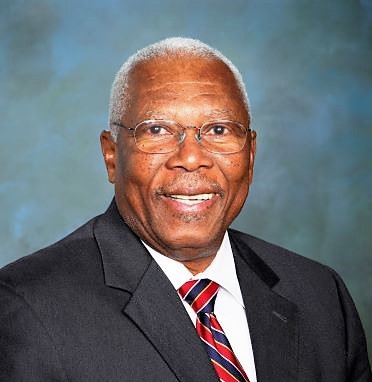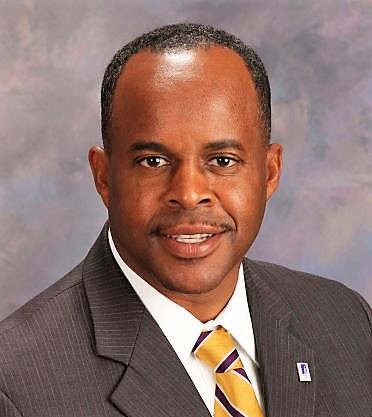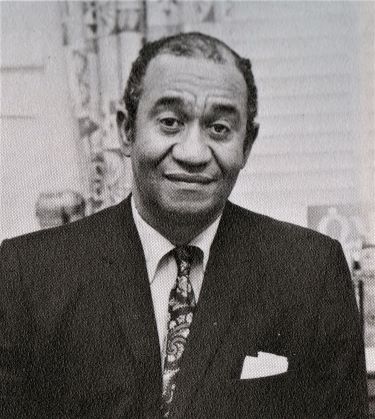
MORTIMER H. NEUFVILLE, UMES interim president for the 2011-12 academic year, is proof you can go home again professionally. He was a senior administrator in Princess Anne between 1983 and 1996, when he held these posts:
• Associate director – Maryland Agriculture Experiment Station
• Associate vice president for academic affairs
• Acting vice president for academic affairs
• Vice president for academic affairs
A Tuskegee (Ala.) Institute graduate with a master’s and doctorate in agriculture from the University of Florida, Neufville came out of retirement to replace Thelma B. Thompson, who left office on Aug. 15, 2011. Neufville, a native of Jamaica like Thompson, spent his career as an educator reaching out to developing nations to help them improve agricultural production.
He came to UMES in 1983 from Lincoln University in Jefferson City, Mo. to be dean of agricultural science and 1890 Research Director under William P. Hytche, who as president hired him.
During his first tour at UMES, Neufville helped secure a federal grant to work with the nation of Cameroon to improve root and tuber crop yields. At the time, it was the largest amount awarded to a historically black institution.
Neufville served on a committee that assembled material placed in a time capsule during UMES’ centennial in 1986 and was also at the university during the 100th anniversary celebration of 1890 federal legislation that gave the school a boost as a land-grant institution.
He left UMES a year before Hytche retired in 1997, but continued working on agriculture outreach programs from Washington, D.C. with the Association of Public Land-grant Universities.

JACKIE THOMAS was appointed interim president of UMES on Aug. 24, 2001 and served one year between the administrations of Dolores Spikes and Thelma B. Thompson.
That year might have been one of America’s most traumatic in more than a generation.
Thomas came to UMES from South Carolina State University (Orangeburg) in August 1990 to teach English and help coach the track team.
Among accomplishments he lists during his 14 years at UMES: the creation of the University Scholars Program and a plan to increase enrollment his curriculum vita says “yielded the largest freshman classes in the history of the institution for three consecutive years.”
He was UMES’ English department chairman before moving into central administration, where he worked as an executive assistant to the president, associate vice president for academic / student affairs and executive vice president.
When the university system’s governing board chose Thompson from Norfolk (Va.) State University, Thomas returned to the classroom as a professor of English and modern languages. He left Princess Anne in the spring of 2004 to become an administrator at Middle Tennessee State University in Murfreesboro.
Western Illinois University in Macomb selected him in January 2008 to be its chief academic officer. In July 2011, at age 50, he became WIU’s 11th president and the first African-American to hold that post. A Calhoun, Ala. native, Thomas is a graduate of Alabama A&M University in Huntsville, earned a master’s degree from Virginia State University in Petersburg and received his doctorate from Indiana University of Pennsylvania.
His WIU colleagues know him as Jack Thomas. He and his wife, Linda, have two sons, Patrick and Darius.

HOWARD EMERY WRIGHT was UMES’ interim leader during the 1970-1971 academic year, bridging the administrations of John Taylor Williams and Archie L. Buffkins .
Born in Philadelphia on March 8, 1908, he came to Maryland State College in 1967 to be academic dean and chief academic officer. A 1932 graduate of Lincoln University in Pennsylvania, he earned a master’s and doctorate in psychology from The Ohio State University.
During the Great Depression, he worked as a high school principal in Georgia and West Virginia. From 1940 to 1945, he was principal of the campus laboratory school at Prairie View (State Normal and Industrial College in Texas, where he also was an education professor.
After World War II, he was a faculty member at North Carolina College for Negroes, now N.C. Central University in Durham, and at Texas Southern University in Houston. From 1961 to 1965, he served as president of Allen University in Columbia, S.C.
He also worked in Washington, D.C., including for the U.S. Office of Education, prior to coming to Maryland State.
Former UMES President William P. Hytche described Wright as “mild-mannered.” He was best known, Hytche noted, “for his strong interest in the campus library” and credits him with being “instrumental in the acquisition of Frederick Douglass Library.”
Wright was a candidate to succeed Williams as the campus’ chief executive, but the state university system’s governing board instead chose Buffkins. Wright moved on to Hampton (Va.) Institute and also taught at Salisbury State College during the mid-1970s before retiring in 1978.
The Spring 1988 edition of the Lincoln Lion, Lincoln University’s alumni newsletter, reported Wright died on January 11 of that year at age 79. He was survived by his wife, the former Roseland D. Days, and Beverly and Howard Wright, two children by a previous marriage.

